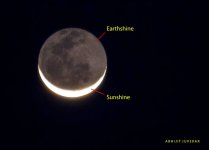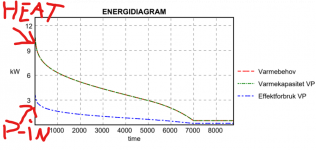Has anyone calculated how long it would take for energy savings to pay back the circa £18,000 installation cost?
A heat pump installation may be viable for a young Kaffimann, but not for an old duffer like me!
A heat pump installation may be viable for a young Kaffimann, but not for an old duffer like me!

Subterranean Heat Pumps are a waste of time. All very well when they work, but when they go wrong you face excavating down to 40 feet to find the broken pipe. 😕
The first image is me reducing my carbon footprint in a ridiculous, but lovely, swimming pool in the Luberon, France. Whole thing fed with hot water by a heat-pump. I was largely fuelled by excellent cheap Provencal Rose wine, TBH. In the background is the White peak of Mont Ventoux, which is as close to resembling the surface of the Moon as I care to go. What fun we had sideswiping "Tour de France Wannabe" cyclists in our fast car there! 😀
Like myself, my sister is quite the Ecologist. She likes gardening, in the second image, and shows our family talent.
Local highlights (Pic 3) include Vincent Van Gogh's lunatic asylum at St. Remy, where he painted many excellent and famous pictures. What you can't see, but GF Elisabeth noticed, is the whole place is infested with scorpions and horseflies! Enough to drive a chap or chapesse mad! 😱
Puts serious hat on. My advice is to "Eat Chicken" to save the World. Reducing Methane and Nitrous Oxide is a much quicker, and cheaper, fix than reducing Carbon Dioxide. 😎
Cutting methane is the best way to avoid disaster | WIRED UK
You heard it here first! 🙂
The first image is me reducing my carbon footprint in a ridiculous, but lovely, swimming pool in the Luberon, France. Whole thing fed with hot water by a heat-pump. I was largely fuelled by excellent cheap Provencal Rose wine, TBH. In the background is the White peak of Mont Ventoux, which is as close to resembling the surface of the Moon as I care to go. What fun we had sideswiping "Tour de France Wannabe" cyclists in our fast car there! 😀
Like myself, my sister is quite the Ecologist. She likes gardening, in the second image, and shows our family talent.
Local highlights (Pic 3) include Vincent Van Gogh's lunatic asylum at St. Remy, where he painted many excellent and famous pictures. What you can't see, but GF Elisabeth noticed, is the whole place is infested with scorpions and horseflies! Enough to drive a chap or chapesse mad! 😱
Puts serious hat on. My advice is to "Eat Chicken" to save the World. Reducing Methane and Nitrous Oxide is a much quicker, and cheaper, fix than reducing Carbon Dioxide. 😎
Cutting methane is the best way to avoid disaster | WIRED UK
You heard it here first! 🙂
Attachments
Looks like new records are being set all the time, I just happened to come across this tweet. This appears to be 0.038 nano Kelvin. I can only wonder what the thermometer looks like!Separately, I’m back on the Motion Mountain books again and found this gem on page 385 of book 1 ( hope you are happy Steve😉 ) wrt to the lowest temperature achieved to date
‘Sodium gas in certain laboratory experiments–coldest temperature ever achieved by man and possibly in the universe = 0.45 nK’
That’s 0.45 nano Kelvin.
https://twitter.com/PhysRevLett/status/1432377327380537353
Physical Review Letters
@PhysRevLett
An innovative matter-wave lens exploiting atomic interactions is able to slow the expansion of a Bose-Einstein condensate in three dimensions, thus reaching an unprecedented ultralow temperature of 38 pK. Letter: https://go.aps.org/3Durt4T Viewpoint: https://go.aps.org/3DvrdTe
12:19 PM · Aug 30, 2021
Was that house in the UK? You do seem to move around. 😉
Yes it was. I was in Asia for 10 yrs, returning in 2015 to the house with the air source heat pump. Moved again end 2017 (only about 10 miles from the original house which we found to be too noisy). In a quiet pan handle next to some protected woods now.
Current house uses gas fired under floor heating - looks like we took a step backwards in that dept. 🙁
Last edited:
@benb the MM author speculated that these are probably the ‘lowest temperatures in the universe’
In an ideal installation, they say that for every unit of electricity used by the pump, you can get between two and four units of heat.
Indeed - though KM is using a deep bore version, by the sound of it, not the usual "under garden" type. So curious as to the expected performance...
Mind you "bedrock" - maybe he's actually going geothermal 😀
Seems to me that well aimed taxes and economics will encourage people to do the right thing on Climate change. But understanding thermodynamics must help.
Bearded Boltzmann actually has his entropy formula S = k log W on his tomb:
Boltzmann's entropy formula - Wikipedia
Electricity is relatively cheap in Norway currently. About a NK a kWh. We pay nearly double that in the UK at 15p per kWh. I thought you Norwegians were sitting on loads of gas and hydroelectric power, along with endless trees for your woodburners!
Double and triple glazing too. Those stick on external thermometers everybody in Norway seems to have. Usually hovering between -5C and -15C in winter! 😱
The Romans were very good on Villa heating in the Northern climes of their Empire. Underfloor heating where the hot smoke efficiently ran under the floor rather than up the chimney. Maybe woodburning. Cheap too, all run by slave labour from the conquered peoples! How it was. 😱
There's a new translation of Julius Caesar's memoirs around. I must get it. A very successful conqueror, especially of the Gauls. He expected to find Order and Efficiency in all corners of his Empire. And we know how good the Romans were at engineering. Even employing their ferocious Legions in down time between wars to build useful infrastructure projects.
My landlord has recently been installing a lot of house insulation to the external walls. It's modern building regulations. Though I find the testing to be slightly dubious. Done with all the doors and windows shut. In reality all the doors and windows were usually open. 😕
Bearded Boltzmann actually has his entropy formula S = k log W on his tomb:
Boltzmann's entropy formula - Wikipedia
Electricity is relatively cheap in Norway currently. About a NK a kWh. We pay nearly double that in the UK at 15p per kWh. I thought you Norwegians were sitting on loads of gas and hydroelectric power, along with endless trees for your woodburners!
Double and triple glazing too. Those stick on external thermometers everybody in Norway seems to have. Usually hovering between -5C and -15C in winter! 😱
The Romans were very good on Villa heating in the Northern climes of their Empire. Underfloor heating where the hot smoke efficiently ran under the floor rather than up the chimney. Maybe woodburning. Cheap too, all run by slave labour from the conquered peoples! How it was. 😱
There's a new translation of Julius Caesar's memoirs around. I must get it. A very successful conqueror, especially of the Gauls. He expected to find Order and Efficiency in all corners of his Empire. And we know how good the Romans were at engineering. Even employing their ferocious Legions in down time between wars to build useful infrastructure projects.
My landlord has recently been installing a lot of house insulation to the external walls. It's modern building regulations. Though I find the testing to be slightly dubious. Done with all the doors and windows shut. In reality all the doors and windows were usually open. 😕
Last edited:
Based on two decades of data, scientists have found that the Earth is reflecting less light back into space.
It may be because of the effect of climate change on cloud patterns.
Climate change is making Earth dimmer | Space
It may be because of the effect of climate change on cloud patterns.
Climate change is making Earth dimmer | Space
Attachments
As a systems engineer, I look at the overall picture, rather than the boggy details. It clearly falls into the category of the "Flippin' Obvious" that the reason the Earth is hotting up is that we are radiating less heat than we are absorbing currently. This is Thermodynamics. 😎
I am not in a Complete Panic about this.
Planet Earth is an ongoing experiment. It really doesn't matter if YOU outrun a BEAR. All that matters is I outrun YOU! You follow? 😀
I have been further investigating Quantum Chromodynamics. Doubtless an interesting contribution to the universe.
Where I have got to so far, is it is Wolfgang Pauli we should be listening to:
Wolfgang Pauli - Wikipedia
One of the first serious Physicists to shave off his old-man beard and embrace the Modern Age of Quantum Theory and Relativity. 😎
Considered by his contemporaries to be smarter than Einstein. Graded poor Physics as either "Utterly Wrong!", or when so dense and unproveable as "Not even Wrong!".
Excellent Progress with Pauli Matrices:
Pauli matrices - Wikipedia
The foundation of Electro-weak theory. Electrons, Photons, maybe W and Z bosons, an' all that.
Hardly a stretch into Gell-Mann Matrices and Quarks:
Gell-Mann matrices - Wikipedia
We can fix this.
I am not in a Complete Panic about this.
Planet Earth is an ongoing experiment. It really doesn't matter if YOU outrun a BEAR. All that matters is I outrun YOU! You follow? 😀
I have been further investigating Quantum Chromodynamics. Doubtless an interesting contribution to the universe.
Where I have got to so far, is it is Wolfgang Pauli we should be listening to:
Wolfgang Pauli - Wikipedia
One of the first serious Physicists to shave off his old-man beard and embrace the Modern Age of Quantum Theory and Relativity. 😎
Considered by his contemporaries to be smarter than Einstein. Graded poor Physics as either "Utterly Wrong!", or when so dense and unproveable as "Not even Wrong!".
Excellent Progress with Pauli Matrices:
Pauli matrices - Wikipedia
The foundation of Electro-weak theory. Electrons, Photons, maybe W and Z bosons, an' all that.
Hardly a stretch into Gell-Mann Matrices and Quarks:
Gell-Mann matrices - Wikipedia
We can fix this.
Pauli matrices? 😱

My head is spinning!In relativistic quantum mechanics, the spinors in four dimensions are 4 × 1 (or 1 × 4) matrices. Hence the Pauli matrices operating on these spinors have to be 4 × 4 matrices.

Wolfgang Pauli was the man who discovered the Fermion. Spin an' all that. He smelt a Rat in existing theories in about 1920.
What happenstance prompted him to that? It was that his Postgrad was in the curious case of the Di-Hydrogen CatIon:
Dihydrogen cation - Wikipedia
It's ridiculous that a tiny single electron should bind two protons in interstellar space whose natural tendency is to repel each other. But that is how our Universe works.
The right man at the right time. 😎
What happenstance prompted him to that? It was that his Postgrad was in the curious case of the Di-Hydrogen CatIon:
Dihydrogen cation - Wikipedia
It's ridiculous that a tiny single electron should bind two protons in interstellar space whose natural tendency is to repel each other. But that is how our Universe works.
The right man at the right time. 😎
Late to reply here, sorry about that, was busy finishing laying new floors.
This particular heat pump gives out typically about 10500 watts of heat from about 3600watts of electrical power, but it's more effective on lower loads. See picture.Interesting....
That ground source heat pump - how much energy can you get from it, and how much energy in does it need to run?
Inadequate here, not much help below -15c when the electric power is most expensive.We had an air source heat pump at my previous house. Superb. Can’t say anything about the ground source heat pump unfortunately.
They'll drill down to 220 meters.Subterranean Heat Pumps are a waste of time. All very well when they work, but when they go wrong you face excavating down to 40 feet to find the broken pipe. 😕
Attachments
I was initially very mystified by gas refrigerators. How come you heat the thing to cool your frozen peas? 😕
Well, we know it's all Thermodynamics...
I can smell a Rat with heat pumps. You might get a 3:1 return on heat pumped per unit of electricity, but the gas fired power station is only 30% efficient at making the same electricity. You might as well just burn the gas yourself, and cut out the middle man. 😎
Different equation with renewable energy like wind turbines and solar panels I suppose. It's free anyway.
I would like to see the matrix of heat pumps, KaffiMann. Pauli would figure it all out. He noticed things.
He had a Ramanujan moment on his sick bed in Zurich. No not Taxicab Number 1729, but he brought to the attention of his visiting assistant his room number in hospital. 137! I leave it to the interested student as to why he found that extremely interesting. 😀
Well, we know it's all Thermodynamics...
I can smell a Rat with heat pumps. You might get a 3:1 return on heat pumped per unit of electricity, but the gas fired power station is only 30% efficient at making the same electricity. You might as well just burn the gas yourself, and cut out the middle man. 😎
Different equation with renewable energy like wind turbines and solar panels I suppose. It's free anyway.
I would like to see the matrix of heat pumps, KaffiMann. Pauli would figure it all out. He noticed things.
He had a Ramanujan moment on his sick bed in Zurich. No not Taxicab Number 1729, but he brought to the attention of his visiting assistant his room number in hospital. 137! I leave it to the interested student as to why he found that extremely interesting. 😀
Late to reply here, sorry about that, was busy finishing laying new floors.
This particular heat pump gives out typically about 10500 watts of heat from about 3600watts of electrical power, but it's more effective on lower loads. See picture.
Inadequate here, not much help below -15c when the electric power is most expensive.
They'll drill down to 220 meters.
What does the time scale signify?
Jan
For the simple minds like mine, air source heat and ground source heat
pumps succinctly explained
A guide to ground source heat pumps - Energy Saving Trust
pumps succinctly explained
A guide to ground source heat pumps - Energy Saving Trust
Attachments
Last edited:
I feel cheated by that simple explanation because there's no mention of latent heat.
When the volatile refrigerant in its liquid phase evaporates to its gaseous phase it absorbs latent heat energy.
When the refrigerant in its gaseous phase condenses to its liquid phase it releases latent heat energy.
The word 'latent' means 'hidden' because in phase changes energy enters or leaves a system without causing a temperature change in the system.
Latent heat transfer is the main way that mechanical heat pumps move heat.
Latent heat - Wikipedia
When the volatile refrigerant in its liquid phase evaporates to its gaseous phase it absorbs latent heat energy.
When the refrigerant in its gaseous phase condenses to its liquid phase it releases latent heat energy.
The word 'latent' means 'hidden' because in phase changes energy enters or leaves a system without causing a temperature change in the system.
Latent heat transfer is the main way that mechanical heat pumps move heat.
Latent heat - Wikipedia
I was interested in when heat pump technology was first introduced and discovered that the technology was established around 160 years ago and that the first ground source heat pump was brought into use around 75 years ago.
There's an interesting history of the technology to be found here:
What is a heat pump? History and information about heat pump technology
There's an interesting history of the technology to be found here:
What is a heat pump? History and information about heat pump technology
Milestones:
- 1748: William Cullen demonstrates artificial refrigeration.
- 1834: Jacob Perkins builds a practical refrigerator with diethyl ether.
- 1852: Lord Kelvin describes the theory underlying heat pump.
- 1855–1857: Peter von Rittinger develops and builds the first heat pump.
- 1945: John Summer builds a full scale water source heat pump in Norwich
- 1983: Lämpöässä build their first heat pump in Lapua, Finland
- Status
- Not open for further replies.
- Home
- Member Areas
- The Lounge
- What is the Universe expanding into..





